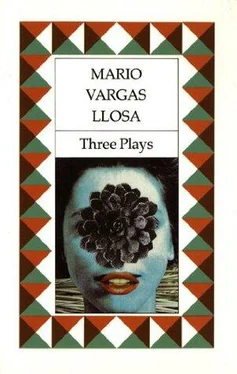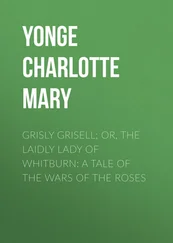MAMAE: ( Opening her eyes ) The mestizos … Yes, it was there, every evening, just when the labourers were returning from the plantations. In the suburb, where the mestizos and the negroes live. In the shanties of La Mar.
AMELIA: You don’t imagine I spend those three thousand soles you give me on myself, do you, Agustín? Every cent goes on Belisario’s education. I can’t even buy myself a handkerchief. I’ve even given up smoking, to save you any more expense.
BELISARIO: ( Looking at the audience, exaggerating ) Me, get a job? No, mother, it’s out of the question. What about the statutory regulations? What about the civil code? The constitutions? The laws of contract? Written law? Common law? I thought you wanted me to become famous so I’d be able to help you all out one day? Well, you’ve got to give me more money for books then! How cynical you could be at times, Belisario.
AGUSTIN: But Belisario could always get a part-time job, Amelia. Hundreds of university students do. You know I’ve always supported your son — and you, ever since your husband killed himself in that stupid way. But things have become very tough recently, and Belisario is quite grown up now. Let me look for a job for him.
CESAR: No, Agustín, Amelia’s right. He must be allowed to finish at the university first. Or he’ll go the same way as I did. I gave up studying to start a job and look at the result. But he was always top of the class. He’s bound to go far. He needs a degree though, because nowadays … ( His voice fades down to a whisper, as MAMAE’ s voice comes to the fore. )
MAMAE: I’ve often been past those shanties. With Uncle Menelao and Aunt Amelia, on the way to the sea. Negroes, mestizos and Indians would come up to us, begging. They’d put their hands right inside the carriage and I remember Uncle Menelao saying: ‘What revolting nails they have.’ I used to be so frightened of them. La Mar looks pretty from a distance with its thatched huts and sandy streets. But when you’re there, you can see that it’s poor, dirty and smelly and it’s full of savage dogs. So it was there you used to meet her.
JOAQUIN: Yes. There. In La Mar. Every evening. We’d meet and watch the sun going down.
( The conversation between AGUSTIN, AMELIA and CESAR now comes to the fore. )
AGUSTIN: Everyone has his reasons, of course. Well, I’ve got mine too. You see, I could say I was fed up with living in lodgings, travelling by bus, and not being able to get married. Ever since the day I started work, over half my salary has been going towards helping Mother and Father, not to mention Amelia and my nephew. I could say I was fed up never being able to go to a good restaurant, never having any holidays, and always having to have my suits repaired. And because I’m fed up, from now on I’m only going to contribute two thousand soles a month towards the upkeep of this house. The same as you. What then would happen to Father and Mother and Mamaé — and what would happen to our future legal genius?
AMELIA: Don’t be so scornful, Agustín. My son will be a great lawyer one day, you’ll see, he’ll have masses of clients and he’ll earn a fortune. I’m not sending him out to work until he finishes his studies. He won’t be a failure and a mediocrity.
AGUSTIN: Like me, you mean.
MAMAE: So every evening, after your guard duty, as I waited for you, saying rosary after rosary to make the time pass more quickly, you were already on your way to her, to La Mar, where you’d talk passionately to her for hours.
JOAQUIN: My little soldier’s girl, my love, your hands — they’re so strong — and yet so soft and gentle. Hold my head here, at the temples, I’ve been riding all morning and my body is throbbing. Press a little harder. It’s so soothing. That’s right. Ah yes, I feel as if my head were sinking into a bed of jasmine.
BELISARIO: You saw straight through me, didn’t you, Uncle Agustín?
CESAR: No. Please, don’t start up again. It’s the same thing day after day. Hasn’t it caused enough bad blood as it is? Instead of arguing, why don’t you think seriously about what I suggested?
AMELIA: I have, César. I’m ready to go along with it. I was against it at first, but I’ve changed my mind.
CESAR: Of course, Amelia. It’s the only sensible thing to do.
( Looks at MAMAE.) She’s already living in another world; she won’t even notice the change. You’ll be more relaxed; you’ll have more time for Mother and Father. They’ll live more comfortably. And it’s even quite likely that Mamaé will be happier, too.
(JOAQUIN has taken hold of MAMAE’ s hands; he kisses them passionately. )
JOAQUIN: But there’s something else about you, Carlota, something I like even more than your hands.
MAMAE: ( Frightened ) What? What else was it you liked about that woman?
AGUSTIN: So we put Mamaé into a home, do we? I see. Do you really think that’s going to solve things. Of course it’s very easy. Especially when you’re all no doubt thinking of that private place, San Isidro, where Aunt Augusta was. I’m sure Mamaé would be fine there. It’s so clean, and they’ve got nurses looking after the old people day and night, they take them out for walks in the gardens. They even show them a film once a week, don’t they? ( Sarcastically ) Have you any idea how much that place costs?
JOAQUIN: Your neck. Let me kiss it, let me smell your sweetness. Yes. Yes, that’s right. Now I want to kiss your ears, put my tongue into those snug little lairs, nibble those pink little lobes. That’s why I love you, my little soldier’s girl. You know how to give me pleasure. You’re not like Elvira, that passionless dummy. She thinks love is all about reading poetry by an idiot who calls himself Federico Barreto.
AGUSTIN: Mamaé wouldn’t go to San Isidro. She’d go to the Beneficencia, which is free. You don’t know about that place, do you? But I’ve taken the trouble to go and see it. The old people there all live on top of each other in the most filthy conditions. They hardly even have any clothes to wear. They’re eaten alive by lice, and they sleep on the floor on sacks. What’s more, it’s in Santo Cristo next to the cemetery so that the old people spend all day watching funerals. Do you really want to send Mamaé there?
MAMAE: ( Very distressed, almost in tears ) We weren’t yet married, Joaquín. I couldn’t let you lose respect for me. It would have lowered me in your eyes. It was for you I did it, for you. So that you would have a wife you wouldn’t be ashamed of.
CESAR: And do you really think Mamaé lives well here? Have you lost all sense of smell, Agustín. You say yourself that every time you have to have a cup of milk in this house, it practically turns your stomach. You must understand I’m not suggesting the home out of spite or anything, but to save you expense. I love her as much as you do.
MAMAE: And what was so wrong about the poetry? That’s how things were in those days. When a woman was in love she read poetry. That’s what young ladies and gentlemen did, Joaquín. Federico Barreto was certainly no fool. He was a great poet. All the girls in Tacna were dying of envy when he wrote those lines on my fan.
AMELIA: ( To AGUSTIN) Do you think I’ve no feelings? I’m the one who baths her, puts her to bed, dresses her; I’m the one who feeds her, don’t forget. But … you’re right. We can’t send Mamaé there. Besides, it’s true — Mother would never agree to it.
JOAQUIN: What a wonderful couple we’d have made, my little soldier’s girl. Such a pity you’re married! When I think of that frigid little saint … I ask myself, will she be capable of satisfying me, when I feel those waves of passion welling up inside me as I do now, ready to break at any moment? ( Speaking in her ear ) Shall I tell you what I’m going to do to Elvira when she’s my wife?
Читать дальше












